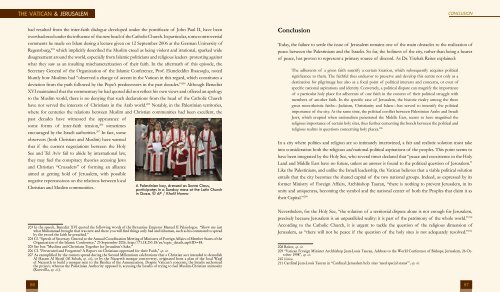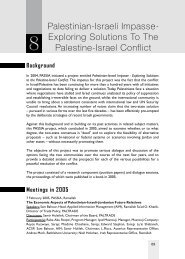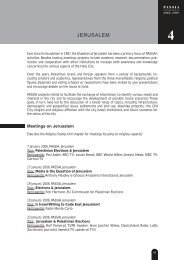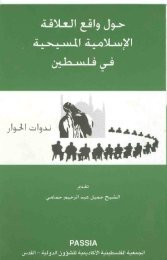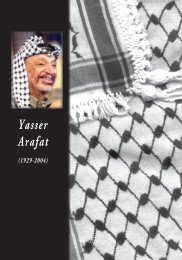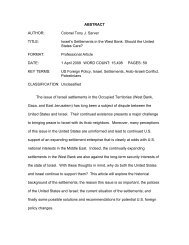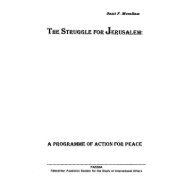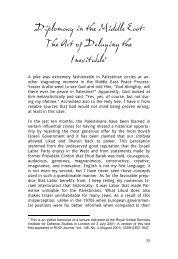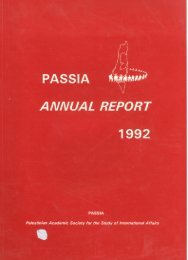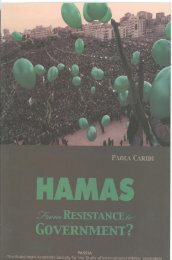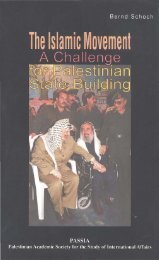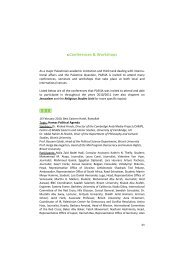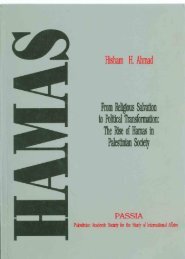<strong>The</strong> Vatican & <strong>Jerusalem</strong><strong>The</strong> Holy See Under Benedict XVI: Losing its Moral Stance?an eloquent illustration of the Church’s ambiguity on the question. 195 Although it aimed at reassuring the56 members of the Islamic organization that:An eventual agreement between the Holy See and the State of Israel will not represent achange in the position of the Holy See regarding the Israeli-Palestinian negotiations and[… that] the Holy See is committed to respecting the principles contained in the BasicAgreement […] of 2000, including those regarding the status of <strong>Jerusalem</strong>,the missive reiterated that:While maintaining in every case the right to exercise its educational, spiritual and moralmission, owing to its own character, the Holy See remains extraneous to all merely temporalor political conflict and claims no competence to enter into territorial disputes betweennations, unless the contending Parties or the International Institutions make concordantappeal to its missions of peace.<strong>The</strong> dubious morality of this official line of neutrality is evident in the subsequent sentence, which states that:<strong>The</strong> Church, with particular attention to fiscal questions, is asking the State of Israel totreat her Institutions in a fair manner, wherever the State of Israel exercises its authority de facto,without taking into consideration or determining whether it does so as a sovereign State or as an occupyingState, thus without entering into the political aspects of the question. 196Although the Vatican is not expected to adopt anaudacious political stance on the Israeli-Palestinianconflict, the reply of the Pope’s highest Emissaryfor Foreign Affairs seems to demonstrate that it hasrecently grown more and more reluctant to use the“right to intervene in spiritual and moral matters”that it has frequently upheld in the past. Some haveblamed this excessive cautiousness and pragmatismon the weakness of the current Nuncio, AntonioArchbishop Franco celebrating the end of his mission,June 2012. © Latin Patriarchate of <strong>Jerusalem</strong>195 Letter by Archbishop Mamberti, Secretary for the Holy See’s Relations with States, addressed to Dr. Ekmeleddin Ihsanoglu,Secretary General of the Organization of Islamic Cooperation, Vatican City, 3 May 2012.196 Emphasis added.Franco, 197 seen by some Palestinians as being manipulated by the Israelis, who are believed to be intenton rushing the conclusion of an economic agreement that would allow Tel Aviv to cash in importantsums in Church’s overdue taxes. Analysts believe also that with the many challenges fronting the HolySee in the 21 st Century—including the ever decreasing number of faithful worldwide, the many scandalsof priests’ pedophilia and recent accusations of financial corruption—the Middle East has become anissue of a somewhat lower priority on its agenda. Many observers, including those within the Vatican,also incriminate the personality of the pope himself, as well as his governance of the Catholic Church,which they characterize as being anachronistically archaic, strictly conservative and somewhat estrangedfrom local communities, especially those which are geographically and culturally remote from Europe. 198In particular, the career of Cardinal Ratzinger, both as Prefect of the Congregation for the Doctrine ofthe Faith and later at the head of the Church, has proven to be quite distant from the ecumenical openingof his predecessor. For instance, it was he who, before his accession to the papacy, wrote the declaration“Dominus Iesus,” 199 in which he claims the superiority of Catholicism over other Christian and non-Christian faiths. Later, this highly contentious stance expressed itself in the new Pope’s ambiguous andrather awkward attitude towards the other religions. On the one hand, perhaps motivated by what someconsider an effort on the part of this German pontiff to make up for the errors of the past, BenedictXVI has undertaken significant gestures of rapprochement with the Jewish world, such as his travel toAuschwitz in May 2006, his visit to a New York synagogue in February 2008 and, in May of the same year,his controversial address to the Ambassador of Israel in which he seemed to offer a religious justificationfor the return of the Jewish people to Palestine. 200 In the meantime, however, some of his decisions haveangered the Jewish world considerably. In particular, they objected to the envisaged beatification of PopePius XII, whom Jews believe had failed to condemn the Holocaust, as well as the reintegration into theCatholic Church of four traditionalist bishops of the Society of St. Pius X 201 formerly excommunicatedby John Paul II. 202 On the other hand, the improved relations between Islam and Christianity, which197 Archbishop Antonio Franco celebrated the end of his mission as Apostolic Nuncio to Israel and Apostolic Delegate to <strong>Jerusalem</strong>and the Palestinian Territories on 28 June 2012. In August 2012, the Holy See appointed as his successor the ItalianArchbishop Giuseppe Lazarotto. However, Bishop Franco is to retain responsibility for negotiations between the Vatican andIsrael over financial relations and Church lands. Cf. “Pope appoints new envoy to Israel, Palestine,” Ma’an News Agency, 19August 2012. http://www.maannews.net/eng/ViewDetails.aspx?ID=513373198 “Que veut le Pape ?” TV documentary, Arte Production, 2010.199 “Declaration ‘Dominus Iesus’ on the Unicity and Salvific Universality of Jesus Christ and the Church,” 6 August 2000, writtenby Cardinal Ratzinger in his position as Prefect of the Congregation for the Doctrine of the Faith. http://www.vatican.va/roman_curia/congregations/cfaith/documents/rc_con_cfaith_doc_20000806_dominus-iesus_en.html.200 “<strong>The</strong> Holy See joins [the Jewish People] in giving thanks to the Lord that the aspirations of the Jewish people for a homein the land of their fathers have been fulfilled.” Address of His Holiness Benedict XVI to His Excellency Mr MordechayLewy, Ambassador of Israel to the Holy See, Monday, 12 May 2008. http://www.vatican.va/holy_father/benedict_xvi/speeches/2008/may/documents/hf_ben-xvi_spe_20080512_ambassador-israel_en.html.201 Founded by the French Archbishop Marcel Lefebvre in 1970 to counter the reforms made in the framework of the SecondVatican Council.202 Including the British Bishop Richard Williamson, found guilty of negationist declarations. In an interview given to a Swedishtelevision program in November 2008, Williamson contested the fact that six million Jews had been killed by the Nazis inconcentration camps and argued that none of them had died in gas chambers. In March 2008, Bishop Williamson also describedas “authentic” the “Protocols of the Elders of Zion,” a forged document portraying Jewish plots for world domination,which was first published in 1903 in Tsarist Russia and then widely circulated. Cf. Pigott, Robert. “Profile: Bishop RichardWilliamson,” BBC News, 16 April 2010. http://news.bbc.co.uk/2/hi/7869565.stm.64 65
<strong>The</strong> Vatican & <strong>Jerusalem</strong>had resulted from the inter-faith dialogue developed under the pontificate of John Paul II, have beenovershadowed under the influence of the new head of the Catholic Church. In particular, some controversialcomments he made on Islam during a lecture given on 12 September 2006 at the German University ofRegensburg, 203 which implicitly described the Muslim creed as being violent and irrational, sparked widedisagreement around the world, especially from Islamic politicians and religious leaders protesting againstwhat they saw as an insulting mischaracterization of their faith. In the aftermath of this episode, theSecretary General of the Organization of the Islamic Conference, Prof. Ekmeleddin Ihsanoglu, notedbluntly how Muslims had “observed a change of accent in the Vatican in this regard, which constitutes adeviation from the path followed by the Pope’s predecessors in the past decades.” 204 Although BenedictXVI maintained that the commentary he had quoted did not reflect his own views and offered an apologyto the Muslim world, there is no denying that such declarations from the head of the Catholic Churchhave not served the interests of Christians in the Arab world. 205 Notably, in the Palestinian territories,where for centuries the relations between Muslim and Christian communities had been excellent, thepast decades have witnessed the appearance ofsome forms of inter-faith tension, 206 sometimesencouraged by the Israeli authorities. 207 In fact, someobservers (both Christian and Muslim) have warnedthat if the current negotiations between the HolySee and Tel Aviv fail to abide by international law,they may fuel the conspiracy theories accusing Jewsand Christian “Crusaders” of forming an allianceaimed at getting hold of <strong>Jerusalem</strong>, with possiblenegative repercussions on the relations between localChristian and Muslim communities.A Palestinian boy, dressed as Santa Claus,participates in a Sunday mass at the Latin Churchin Gaza. © AP / Khalil HamraConclusionConclusionToday, the failure to settle the issue of <strong>Jerusalem</strong> remains one of the main obstacles to the realization ofpeace between the Palestinians and the Israelis. So far, the holiness of the city, rather than being a bearerof peace, has proven to represent a primary source of discord. As Dr. Yitzhak Reiter explained:<strong>The</strong> adherents of a given faith sanctify a certain location, which subsequently acquires politicalsignificance to them. <strong>The</strong> faithful thus endeavor to preserve and develop this centre not only as adestination for pilgrimage but also as a focal point of political interests and concerns, or even ofspecific national aspirations and identity. Conversely, a political dispute can magnify the importanceof a particular holy place for adherents of one faith in the context of their political struggle withmembers of another faith. In the specific case of <strong>Jerusalem</strong>, the historic rivalry among the threegreat monotheistic faiths—Judaism, Christianity and Islam—has served to intensify the politicalimportance of the city. At the same time, the political conflict between Palestinian Arabs and IsraeliJews, which erupted when nationalism penetrated the Middle East, seems to have magnified thereligious importance of certain holy sites, thus further cementing the bonds between the political andreligious realms in questions concerning holy places. 208In a city where politics and religion are so intimately intertwined, a fair and realistic solution must takeinto consideration both the religious and national-political aspirations of the peoples. This point seems tohave been integrated by the Holy See, who several times declared that “peace and coexistence in the HolyLand and Middle East have no future, unless an answer is found to the political question of <strong>Jerusalem</strong>.”Like the Palestinians, and unlike the Israeli leadership, the Vatican believes that a viable political solutionentails that the city becomes the shared capital of the two national groups. Indeed, as expressed by itsformer Ministry of Foreign Affairs, Archbishop Tauran, “there is nothing to prevent <strong>Jerusalem</strong>, in itsunity and uniqueness, becoming the symbol and the national center of both the Peoples that claim it astheir Capital.” 209203 In the speech, Benedict XVI quoted the following words of the Byzantine Emperor Manuel II Palaiologos: “Show me justwhat Muhammad brought that was new and there you will find things only bad and inhuman, such as his command to spreadby the sword the faith he preached.”204 Cf. “Speech of Secretary General to the Annual Coordination Meeting of Ministers of Foreign Affairs of Member States of theOrganization of the Islamic Conference,” 25 September 2006, http://71.18.253.18/en/topic_details.asp?tID=84.205 See box “Muslims and Christians Together for <strong>Jerusalem</strong>’s Sake.”206 Cf. “Persecuted and Forgotten? A Report on Christians oppressed for their Faith,” op. cit.207 As exemplified by the rumors spread during the Second Millennium celebrations that a Christian sect intended to demolishAl Haram Al Sharif (Al Subah, op. cit.), or by the Nazareth mosque controversy, originated from a plan of the local Waqfof Nazareth to build a mosque next to the Basilica of the Annunciation. Despite Vatican’s concerns, the Israelis authorizedthe project, whereas the Palestinian Authority opposed it, accusing the Israelis of trying to fuel Muslim-Christian animosity(Kuruvilla, op. cit.).Nevertheless, for the Holy See, “the solution of a territorial dispute alone is not enough for <strong>Jerusalem</strong>,precisely because <strong>Jerusalem</strong> is an unparalleled reality: it is part of the patrimony of the whole world.” 210According to the Catholic Church, it is urgent to tackle the question of the religious dimension of<strong>Jerusalem</strong>, as “there will not be peace if the question of the holy sites is not adequately resolved.” 211208 Reiter, op. cit.209 “Vatican Foreign Minister Archbishop Jean-Louis Tauran, Address to the World Conference of Bishops, <strong>Jerusalem</strong>, 26 October1998”, op. cit.210 Ibidem.211 Cardinal Jean-Louis Tauran in “Cardinal: <strong>Jerusalem</strong> holy sites ‘need special status’”, op. cit.6667


